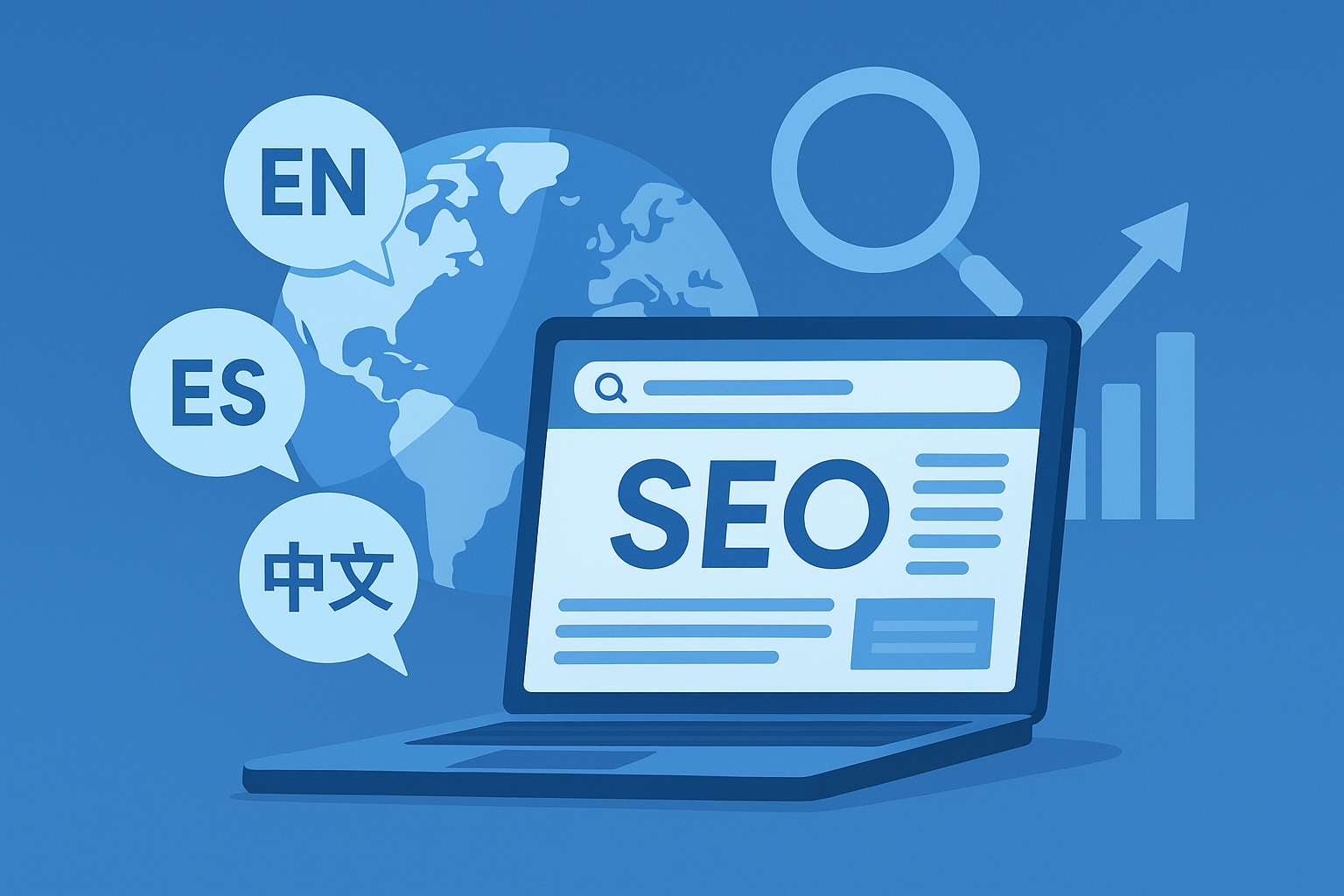What Is Multilingual SEO & Why It Matters

Multilingual SEO is optimizing your website content to rank in multiple languages, targeting international audiences effectively. Unlike international SEO, which primarily focuses on location-based targeting, multilingual SEO emphasizes language optimization.
With non-English searches steadily rising—over 70% of internet users now prefer content in their native language—multilingual SEO ensures you don't miss global opportunities. Weglot highlights that multilingual websites achieve higher conversions due to improved user experience.
Google’s Helpful Content updates also reward multilingual content, prioritizing relevance and quality in local languages. Proper multilingual SEO strategies signal to Google that your content is valuable globally.
Multilingual SEO services: choosing the right partner
Building multilingual capabilities in-house can be resource-intensive. Outsourcing to specialized multilingual SEO services online can save significant effort.
Core features your vendor must offer
- Dedicated language URLs & hreflang automation: Ensures your content ranks correctly without duplicate penalties.
- Local-keyword research support: Uncovers phrases your audience genuinely uses.
- Scalable translation workflow (AI + human QA): Balances cost-efficiency with high-quality, culturally relevant translations.
Where SearchSEO’s Traffic Bot Fits
Geo-targeted, language-specific traffic that speaks your audience’s language
Multilingual SEO isn’t just about translating keywords—it’s about making your site visible and relevant in every language and region you operate in. SearchSEO’s traffic bot supports real browser visits from residential IPs, mimicking real users from your target country and language.
Whether you're targeting French keywords in Quebec, Arabic in Dubai, or Japanese in Tokyo, you can drive CTR-boosting clicks from specific languages and locations—no guesswork, no generic traffic.
Accelerate indexation in target locales
New pages in secondary languages often get indexed slower. Our bot sends keyword-targeted clicks that speed up indexation in Google and Bing for non-English content, so your international SEO gains traction faster.
Multilingual keyword targeting made simple
SearchSEO supports any keyword in any language. Just paste your localized terms—accent marks, characters, and all—and set the traffic origin by country or region. This makes it easy to test international visibility or support campaigns across multiple markets with zero language limitations.
Clean data in GA4 & Search Console
All visits are search-engine initiated, not direct. That means clicks show up as organic search traffic in GA4 and Google Search Console, categorized by the region and keyword set you defined. You’ll see exactly how multilingual pages perform under real-world search conditions—great for tracking engagement signals and international keyword effectiveness.
Why it matters for multilingual SEO
Localized pages need visibility to win. By improving click-through rate (CTR) from real, geo-matched users, SearchSEO helps signal relevance to search engines—especially in regions where CTR is weighted heavily (like Bing in EMEA or Google in LATAM). Used strategically, it’s the perfect support tool for international SEO rollouts, content localization testing, or boosting non-English keyword rankings.
Multilingual SEO Strategy: 7-Step Framework
- Identify High-ROI Markets & Languages: Leverage tools like Semrush to pinpoint profitable languages and regions.
- Local Keyword Research & Search-Intent Mapping: Determine searchers' real intent using multilingual SEO tips provided by tools like Weglot.
- Pick the Best URL Architecture (ccTLD vs. subfolder vs. subdomain): Choose a structure like ccTLDs for authority or subfolders for ease of management.
- Translate + Localize On-Page Elements: Optimize multilingual SEO translation content, including titles, meta tags, alt text, and schema markup.
- Implement Hreflang & Multilingual Markup Correctly: Ensure accurate content indexing and eliminate duplication issues.
- Build Language-Relevant Backlinks & Digital PR: Increase credibility and rankings through localized authority links.
- Measure, A/B-Test & Boost with Targeted Traffic Bots: Continuously optimize content using engagement data.
Multilingual SEO Best Practices Checklist (Quick-Hit)
Technical Foundations
- Dedicated URLs per language
- One language per page
- Optimize Core Web Vitals for fast loading
Content & UX
- Translate metadata and URL slugs
- Avoid relying solely on machine translations
- Align content to local currency, measurement units, and cultural expectations
Monitoring
- Country-filtered Search Console profiles
- Regular crawl tests to catch hreflang errors
Multilingual SEO marketing: turning content into pipeline
- Localized email nurtures & social syndication: Maximize the multilingual SEO experience through personalized customer journeys.
- Leveraging micro-influencers: Amplify localized content credibility.
- Pairing organic with paid “language-match” campaigns: Boost immediate visibility alongside long-term organic growth.
Multilingual SEO keywords: research, clustering & mapping
- Start with native-speaker keyword lists.
- Expand via tools and validate SERP intent.
- Avoid translation pitfalls, such as "false friends" or inadvertent brand-term cannibalization.
Common pitfalls & how to dodge them
- Duplicate multilingual content
- Auto-translated keywords
- Inconsistent hreflang markup
- Ignoring localized backlink strategies
Ready to flood your multilingual pages with real-human signals—and revenue?
Spin up a 3-day free trial of SearchSEO Traffic Bot and watch your localized rankings rise.


.svg)

.svg)
%201.png)








.svg)